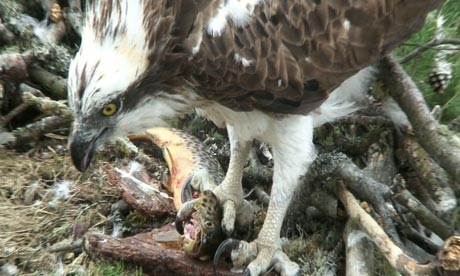Lay Lady lay ... record-breaking osprey does it again with egg #59
Scottish Wildlife Trust says Lady, a 26-year-old osprey in Perthshire, has confounded fears she might never breed again

You can watch Lady nurturing her egg on a webcam directed at her eyrie. Photograph: AP
A venerable osprey that has already set records for breeding successhas delighted conservationists and bird lovers by laying her 59th egg, confounding fears she might never breed again.
The Scottish Wildlife Trust said that Lady, a 26-year-old osprey nesting at the Lowes wildlife reserve in Perthshire, had laid her first egg of the breeding season after her latest mate returned to their nest.
Reserve staff spotted Lady hunched protectively over the egg in her eyrie high up in a Scots pine at lunchtime. The trust has now put in place a round-the-clock guard to prevent egg thieves and vandals reaching her nest.
Ospreys normally lay two to four eggs per season, so the reserve is hoping for at least one further egg to be laid, with the first chick expected within a week. The drama is being streamed live around the world, with a"nest cam" trained on the eyrie.
Lady broke another record last month when she returned for her 21st season at the Lowes reserve from a 6,000-mile round trip to winter in Gambia. After surviving a difficult summer when she fell seriously ill from dehydration and starvation, the trust feared she was unlikely to return home.
Most ospreys live to be eight or 10 in the wild, producing up to 20 eggs; Lady is now 26 and has bred 48 surviving chicks. That total means she is now one of Britain's most important birds of prey, a matriarch playing a significant role in propping up the species' numbers.
Persecuted to extinction as a breeding bird in the UK in 1916, the osprey recolonised naturally in the 1950s but remains one of the UK's rarest birds of prey. It is less common than the golden eagle, with an estimated 200 breeding pairs around Britain.
Anna Cheshier, the trust's Perthshire ranger, said: "If chicks successfully hatch from the eggs, this osprey will have produced 49 or even 50 chicks, an incredible contribution to the recovering osprey population breeding in Scotland.
"We hope to raise enough money to track these chicks using satellite tags this year, to find out about their inherited migration path and learn useful information which could help protect ospreys during migration."
No comments:
Post a Comment